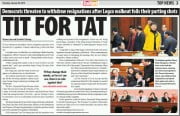The Standard calls it tit for tat. Predictably, many of Hong Kong’s pro-Beijing lawmakers parade out of the Legislative Council, depriving the proceedings of a quorum and forcing the meeting to adjourn. The five pro-democrats resigning to force a de-facto referendum are left to deliver their personal statements to the crowd and media outside.
 To loyalists who see the struggle between the two camps as a sort of boxing match, this is a punch on the nose to the troublemakers who are resorting to wilder and wilder tactics in their campaign for reform. The walkout gives them the pleasure of getting their own back on the opposition for the resignation ploy with another legal but arguably underhand gimmick.
To loyalists who see the struggle between the two camps as a sort of boxing match, this is a punch on the nose to the troublemakers who are resorting to wilder and wilder tactics in their campaign for reform. The walkout gives them the pleasure of getting their own back on the opposition for the resignation ploy with another legal but arguably underhand gimmick.
But it is not tit for tat, as this is not a symmetrical conflict. The fight is not taking place on a level playing field. One side largely comprises representatives elected in democratic elections, while many members of the other side had their positions of influence handed to them on a plate. When the former exploits rules and procedures for tactical gain they can at least point to a popular mandate and a bit of moral high ground. When the latter pulls a similar stunt, it is from a position of unfair advantage.
If we cast our minds back to 2003 when the Article 23 national security legislation was being pushed through Legco, we might recall the pro-Beijing lawmakers emerging from the chamber one day with smug grins on their faces. While their pro-democracy colleagues (and some officials) had been away attending an academic conference on the proposed law, they had used their momentary overwhelming majority on the bills committee to wave the remaining parts of the bill through and pass a motion declaring the discussion finished. As a parliamentary tactic it was legal, and they thought they were being clever. Fifteen days later, over half a million people were on the streets.
In asymmetric struggles, two sides have unquantifiably different resources and methods. In Vietnam, one side had the support of B52 bombers while the other had the support of peasant villagers and urban infiltrators. Hong Kong’s League of Social Democrats, with their Trotskyite influences, have always seen working within the system as a snare; losing their seats in a by-election means nothing to them. The post-80s generation protesting the high-speed rail link don’t know or care what a quorum is. The Civic Party are increasingly seeing their presence in the weak, rigged Legco as pointless and are becoming open to other, maybe less lawyerly, forms of action.
The Democratic Party, the grandfather of the pro-democracy struggle, is divided. Since two of its founders, Martin Lee and Szeto Wah, were kicked off the Basic Law Drafting Committee, its members have invested over two decades of effort into prompting change through logical argument and moral suasion – to zero effect. Perhaps the DP will divide into two strands: traditionalists dreaming that Beijing will one day sit down and treat them as equals and concede universal suffrage, and activists with their sights on tycoons, cronyism and all the other uneven features of the day-to-day social and economic, rather than abstract ‘political’, side of the playing field.
To those in the pro-Beijing camp enjoying the prospect of more punches of pro-democrat noses, it looks good: the pro-dems are falling apart, and the by-elections look like becoming a humiliating farce apparently boycotted by the vast majority of the voters. But to the opposition, such setbacks will simply confirm that they should quit the uneven playing field and take their anger and frustration elsewhere. Not really good at all.

Is Civic the big loser in all this? I thought the whole point of Civic was that they hoped to even the playing field by being even themselves, to prove that a more democratic HK is not necessarily a more anarchic one. But they’re getting led by the nose by the LSD in all this.
LSD doesn’t care about results because their whole point is spectacle and being absurd to demonstrate others’ absurity. DP is probably okay with sitting out as they immediately become a default option in the future for nominal democrats that still that a chance in Hell on talking with anyone north of the SHenzhen River now. The brownnosers are relieved that the LSD is giving them tons of excuses to sit out this thing while looking only half like a turtle. But Civic?
Maybe they came to the conclusion, like you said, that there is no way out of the rigged game and so they want to destroy their reputation in a blaze of glory. But if they feel that their initial premise on entering Legco is no longer sustainable, I would’ve appreciatedthe honesty of telling the rest of us.
You either have dirty hands or no hands (Sartre or perhaps it was Voltaire).
The problem is of course that the nearest most HK Democrats got to getting their hands dirty was wiping away some espresso grinds.
But things are changing.
Revolutions always take people by surprise. Ten years after one, it all seemed so inevitable.
Viva la revolucion! Viva Emily! Viva Christina Tetas Grandes!